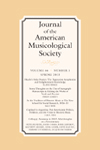
JOURNAL OF THE AMERICAN MUSICOLOGICAL SOCIETY
Scope & Guideline
Exploring the depths of musical understanding.
Introduction
Aims and Scopes
- Interdisciplinary Musicology:
The journal promotes an interdisciplinary approach to musicology, integrating insights from fields such as cultural studies, anthropology, history, and cognitive science to deepen the understanding of musical phenomena. - Cultural and Historical Contexts:
A consistent focus is placed on examining music within its cultural and historical contexts, exploring how music interacts with societal changes, politics, and identity. - Emerging Music Genres and Practices:
The journal covers a wide range of music genres, including classical, popular, folk, and experimental music, often addressing contemporary practices and their implications for music scholarship. - Technological Innovations in Music:
An emphasis on digital scholarship and technological innovations in music analysis and preservation, reflecting the evolving nature of music production and consumption. - Social Justice and Music:
The journal increasingly addresses themes of race, gender, and social justice in music, exploring how these factors influence musical creation, performance, and reception. - Global Perspectives:
The journal seeks to broaden the scope of music scholarship by including global perspectives, particularly regarding non-Western musical traditions and their interactions with Western music.
Trending and Emerging
- Intersections of Music and Identity:
There is a growing trend of exploring how music intersects with various aspects of identity, including race, gender, and nationality, reflecting societal movements and cultural shifts. - Digital and Multimedia Scholarship:
The rise of digital tools and platforms for music analysis and dissemination has led to an increase in articles discussing digital scholarship, multimedia projects, and the implications of technology on music. - Global Music Histories:
A notable trend is the exploration of global music histories, emphasizing the interconnectedness of musical traditions and the impact of globalization on music practices. - Music and Social Justice:
The journal is increasingly focusing on music's role in social justice movements, examining how music can be a form of resistance, expression, and community building. - Cognitive and Psychological Approaches to Music:
Emerging themes include the cognitive aspects of music perception and performance, exploring how psychological theories can enhance understanding of music's impact on individuals and societies.
Declining or Waning
- Traditional Classical Music Analysis:
There is a noticeable decline in the publication of papers strictly analyzing traditional classical music forms and composers without integrating broader cultural or thematic contexts. - Historical Music Theory:
Papers solely dedicated to historical music theory concepts without contemporary relevance or interdisciplinary connections have become less frequent. - Eurocentric Music History:
The focus on Eurocentric narratives in music history is diminishing as the journal increasingly embraces global music perspectives, leading to fewer articles centered exclusively on Western musical traditions. - Biographical Studies of Composers:
While biographical studies remain relevant, there has been a shift away from purely biographical accounts towards analyses that connect composers' lives with broader social and cultural movements. - Musicological Pedagogy:
The exploration of pedagogical approaches in musicology is becoming less prevalent, with fewer articles discussing teaching methodologies or music education frameworks.
Similar Journals

HUDEBNI VEDA
Advancing Research in Musical ScholarshipHUDEBNI VEDA is a distinguished journal published by the Czech Academy of Sciences Press, specializing in the field of music. With its ISSN 0018-7003 and E-ISSN 2694-6998, this journal serves as a vital platform for scholarly communication in music studies, promoting innovative research and critical discourse. Since its inception in 2002 and scheduled for continuation until 2024, it has emerged as a respected publication within the music academic community, though currently holding a Category Quartiles ranking of Q4 in Music. Notably, it ranks #127 out of 180 in the Scopus Arts and Humanities - Music category, placing it in the 29th percentile. While it operates under traditional access constraints, HUDEBNI VEDA is committed to fostering an inclusive academic environment, inviting contributions that push the boundaries of musicology. This journal is essential for researchers, professionals, and students eager to explore and engage with contemporary issues and developments in the study of music.
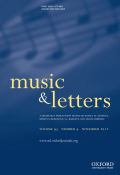
MUSIC & LETTERS
Illuminating the Intersections of Culture and CompositionMUSIC & LETTERS, published by Oxford University Press, is a prominent academic journal that has been at the forefront of musicology and music studies since its inception in 1920. With an ISSN of 0027-4224 and an E-ISSN of 1477-4631, the journal provides a platform for scholarly articles that explore the rich interplay between music and literature, contributing significantly to the understanding of musical context, form, and societal impact. As of 2023, it holds a respectable Q3 rank in Music within its category, positioned at Rank #66 out of 180 in the Scopus Arts and Humanities Music category. Despite not being an Open Access journal, its rigorous peer-review process and commitment to high-quality research make it an essential resource for researchers, professionals, and students alike. The journal's scope encompasses various genres and historical periods, ensuring a comprehensive examination of music's role in culture and community, thereby enhancing the scholarly discourse within this vibrant field. Based in the United Kingdom, at Great Clarendon St, Oxford OX2 6DP, England, MUSIC & LETTERS continues to inspire and inform the global music scholarly community.

Muzikoloski Zbornik
Elevating Musicology to New HeightsMuzikoloski Zbornik is a prominent open-access journal in the field of musicology, published by the esteemed University of Ljubljana Press since 1965. Hailing from Slovenia, this journal has been dedicated to advancing the study of musical heritage, theory, and practice, serving as a vital platform for researchers, professionals, and students alike. With a notable Q2 category ranking in the field of music and a Scopus ranking of 109 out of 180 in Arts and Humanities, Muzikoloski Zbornik showcases high-quality research, fostering discourse and collaboration among scholars globally. The journal embraces a diverse range of topics, from ethnomusicology to music education, ensuring its relevance in an ever-evolving academic landscape. By providing unrestricted access to its content, it champions the dissemination of knowledge and supports the growth of the musicology discipline.

REVUE DE MUSICOLOGIE
Charting New Territories in Music ResearchREVUE DE MUSICOLOGIE is a prominent academic journal dedicated to the diverse field of musicology, published by EDITIONS TRANSATLANTIQUES in France. With an ISSN of 0035-1601, this journal has been a key platform for researchers and scholars since its inception, fostering scholarly discourse and advancing the understanding of music's cultural, theoretical, and historical dimensions. Although it currently holds a Q4 category in Music according to the 2023 quartiles and is ranked #140 in the Scopus Arts and Humanities Music category, REVUE DE MUSICOLOGIE continues to publish valuable insights that contribute to the global musicological landscape. The journal does not offer open access, adhering to standard subscription models. Its primary objective is to provide a rigorous forum for original research articles, reviews, and theoretical discussions, making it an essential resource for academics, professionals, and students in the field of musicology. Located at 50 RUE JOSEPH DE MAISTRE, 75018 PARIS, FRANCE, it promises to remain a vital part of music research through 2023 and beyond.
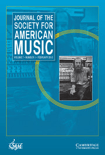
Journal of the Society for American Music
Celebrating the Vibrancy of America's Musical HeritageThe Journal of the Society for American Music is a leading academic journal dedicated to the study of American music and its diverse cultural contexts. Published by Cambridge University Press, this journal serves as a vital platform for researchers and professionals in the fields of musicology, ethnomusicology, and American studies, contributing significantly to scholarly discourse and advancing knowledge in these areas. With an impressive impact factor reflecting its academic rigor, it is placed in Q2 of the music category as of 2023 and ranks #55 out of 180 in the Arts and Humanities segment, placing it in the 69th percentile among its peers. Since its inception, the journal has published a wealth of articles, reviews, and critical studies that explore the rich tapestry of American musical traditions from historical and contemporary perspectives. It operates under a subscription model, ensuring a wide distribution and accessibility to its important findings. Researchers, students, and professionals alike will find the journal an essential resource for advancing their understanding of the dynamic landscape of American music.

MUSICAL TIMES
Exploring the Harmonies of Academic MusicologyMUSICAL TIMES is a distinguished journal dedicated to the exploration and dissemination of scholarly works in the realm of music, serving as an essential resource for researchers, professionals, and students alike. Published by MUSICAL TIMES PUBLICATIONS LTD, this journal has built a robust reputation within the arts and humanities, specifically focusing on music studies, with an impactful reach indicated by its Scopus ranking at #73 out of 106 in the field. Though access to this journal is not open, its curated content, which spans various facets of musicology and contemporary music discourse, enriches the academic community by encouraging insightful discussions and critical analyses. With its historical roots tracing back to its inception, MUSICAL TIMES aims to foster a deeper understanding of music's cultural, social, and artistic dimensions, making it a valued publication for those engaged in the scholarly pursuit of music.
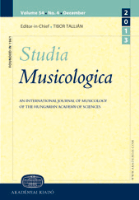
Studia Musicologica
Advancing Scholarly Discourse in Music StudiesStudia Musicologica, published by AKADEMIAI KIADO ZRT, stands as a leading journal in the field of musicology, dedicated to the exploration and analysis of music across diverse cultures and historical contexts. With its ISSN 1788-6244 and E-ISSN 1789-2422, this journal provides an essential platform for disseminating high-quality research and critical analyses, thereby contributing significantly to scholarly discourse in music studies. Although it operates on a traditional access model, its rigor and foundational contributions ensure that it remains invaluable for researchers, professionals, and students alike. Situated in the heart of Hungary, Studia Musicologica engages with a broad spectrum of topics including music theory, ethnomusicology, and music history, fostering a deeper understanding of music's multifaceted role in society. This makes it an essential resource for anyone interested in advancing their research or professional practice within the expansive field of musicology.
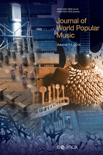
Journal of World Popular Music
Unveiling Diverse Voices in Popular Music StudiesJournal of World Popular Music, published by EQUINOX PUBLISHING LTD, serves as a pivotal platform for scholars and practitioners within the evolving field of popular music studies. With an ISSN of 2052-4900, this esteemed journal has notably positioned itself within the Q2 category of Music as of 2023 and ranks at #90 out of 180 in the Arts and Humanities sector according to Scopus metrics. Spanning research from 2014 to 2023, the journal invites contributions that span diverse musical genres, cultural studies, and global perspectives, ultimately enriching the discourse surrounding the sociocultural impact of popular music. While not open access, the journal offers a robust platform for interdisciplinary research, making it indispensable for researchers, educators, and students keen on exploring the dynamics of popular music and its role in contemporary societies.
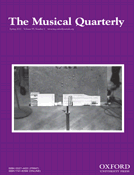
MUSICAL QUARTERLY
Navigating the Evolving Landscape of Music StudiesMUSICAL QUARTERLY, published by Oxford University Press Inc, is a distinguished journal in the field of music, with a publication history that stretches back to 1915. This esteemed journal, identifiable by its ISSN 0027-4631 and E-ISSN 1741-8399, provides a critical platform for scholarly discourse, analysis, and research in musicology and related disciplines, facilitating an understanding of both historical and contemporary musical practices. Although it operates without open access, it continues to attract a diverse readership of researchers, educators, and students alike, thanks to its well-curated articles and reviews that engage with music theory, history, and ethnomusicology. With a current Scopus rank of #119 out of 180 in the Arts and Humanities category and a 34th percentile ranking in Music, MUSICAL QUARTERLY plays a vital role in advancing knowledge and fostering collaboration within the music academic community. Its commitment to high-quality scholarship is reflected in its ongoing efforts to address the evolving landscape of music studies, making it an essential resource for anyone serious about exploring the rich tapestry of music scholarship.

Music Theory Online
Illuminating the World of Music Theory: A Scholarly JourneyMusic Theory Online is a distinguished journal within the field of music, published by the Société for Music Theory. With an ISSN of 1067-3040, this open access journal has been providing valuable insights and scholarly contributions since 1993. Based in the United States, at the University of Chicago, Department of Music, it serves as a platform for rigorous research and discourse in music theory. The journal has achieved significant recognition, attaining a Q1 ranking within its category for 2023 and positioning itself at the 26th percentile among 180 journals in the Arts and Humanities, demonstrating its impact on the field. Facilitating access to cutting-edge studies, Music Theory Online aims to engage researchers, educators, and students by fostering a deeper understanding of music theory concepts and methodologies, thereby contributing to the advancement of musical scholarship.